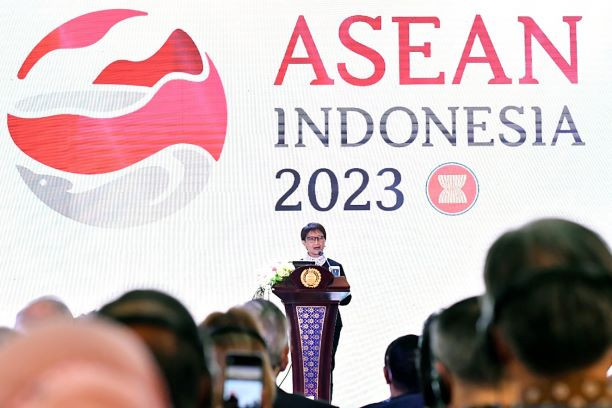Popular Reads
Top Results
Can't find what you're looking for?
View all search resultsPopular Reads
Top Results
Can't find what you're looking for?
View all search resultsFor Indonesia, influence lies in diplomacy: Study
RI’s military power found to be lagging.
Change text size
Gift Premium Articles
to Anyone
D
espite the prevailing narrative that countries in the Indo-Pacific are struggling to navigate complex power rivalry in the region, Southeast Asia is more diplomatically dynamic than ever, a recent Lowy Asia Power Index report found on Sunday.
And while COVID-19 has negatively affected most nations, Indonesia has successfully maintained its position as among Asia’s top-10 powers following its recent diplomatic feats, the study said.
While diplomacy and resilience are among Jakarta’s best performing categories, its military capability and defense networks remain lackluster, a weakness that experts say is rooted in a greater focus on strengthening regional stability rather than becoming entangled in militaristic pursuits.
The study, published by Sydney-based think tank the Lowy Institute, ranked 26 countries and territories using several measures of power based on resources and influence using nearly a decade’s worth of data leading up to 2022.
The 2023 edition, marked as one of the most comprehensive overviews of the shifting distribution power within Asia, expectedly named the United States and China as the two most powerful countries with scores of 80.7 and 72.5 respectively. With a score of 37.2, Japan was in the third position as a “middle power” followed by India, Russia and Australia.
The index placed Indonesia, Southeast Asia’s largest country in terms of population and economy, as the ninth largest power in the region with a score of 19.4.
Only Indonesia and Australia saw no shift in their score while the other top-10 powers saw a downward change.
“Indonesia’s strong performance is mostly due to an increase in its diplomatic influence,” index author Susannah Patton told The Jakarta Post on Monday.
Indonesia’s diplomatic convening power is second overall, two points behind China and seven points ahead of the US. Of all the countries in the region, Indonesia conducts the greatest number of diplomatic dialogues with Singapore, China and Japan.
Military drawbacks
While Indonesia fell short in military categories, ranking 13th for both “military capability” and “defense networks”, it performed best in measures of “resilience” and “diplomatic influence”, where it ranked seventh for both.
Military capability was measured by defense spending, the total number of active military forces, weapons, intelligence capabilities and strategic advantages in warfare.
Asked about Indonesia’s poor performance in these categories, Foreign Policy Community of Indonesia (FPCI) cofounder and National Research and Innovation Agency (BRIN) research professor, Dewi Fortuna Anwar, concluded that “Indonesia doesn’t have the ambition to be offensive.”
In 2021, the World Bank reported that Indonesia invested 0.7 percent of its GDP on military expenditure, some US$8,259 million compared with 3.5 percent in the US and China’s 1.7 percent. In late 2021, President Joko “Jokowi” Widodo suggested that military reform was due to improve Indonesia’s defense, though progress has been sluggish due to a lack of technological advancements.
“One of the primary core problems was indeed the allocation of resources for research advancements. But that was not the only problem; there are obstacles in the human resources too,” said National Defense Institute (Lemhanas) governor Andi Widjajanto last year.
But despite the shortcoming, Dewi suggested that it was diplomacy and not defense that would “accrue a lot of benefits for regional stability”.
“If Indonesia spends a lot of money on defense, it'll only threaten Australia,” she told the Post.
Despite Indonesia’s comparably low scores in its defense and military capabilities, Lowy reported that “Indonesia is a net overachiever in Asia”. The report found that Indonesia has an ever-improving “positive power gap” which refers to the region exerting more influence than should be expected given its resources.
Power without perspective
While the Lowy Index is by no means without any shortcomings, Dewi said that it was a useful tool to understand regional politics nonetheless.
“[The index] is not politically driven or influenced,” Dewi asserted.
But, she continued, it is equally important to remember “what it doesn’t say about strategic weight” or indeed, about how a country views the world and its environment.
“The Asia Power Index is the only comprehensive assessment of power in Asia, focusing on all aspects of power, from military and economic capability through to cultural influence and diplomatic relationships,” Patton said. “It enables us to track over time how power is shifting, and avoid making the wrong assumptions.”
The 2023 Asia Power Index is available as a report or can be viewed online as an interactive presentation.
-- Writer Kate Newsome is an intern under the ACICIS placement program.










